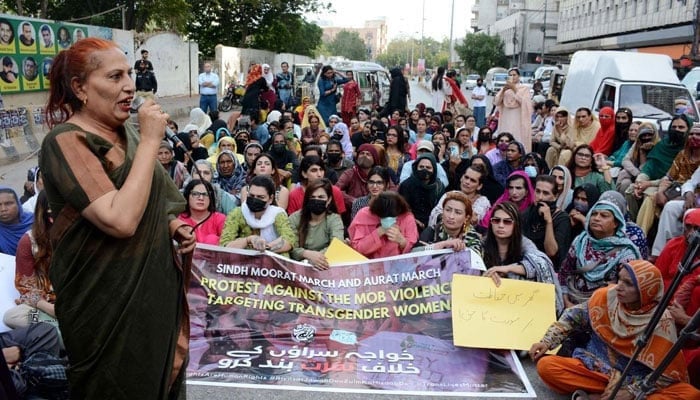Confronting hatred
Reason attacks on transgender persons are so common is that the perpetrators feel they have immunity for their actions
We as a nation need to realize how little protection is afforded to the most vulnerable among us. Although hatred and lack of tolerance for people have affected society as a whole, its worst impacts have been borne by the country’s marginalized communities, especially the transgender community. The problem is not just one of law enforcement and a lack of official action. It is our duty as citizens to create a society where all feel welcome and safe. The reason attacks on transgender persons are so common is that the perpetrators feel they have immunity for their actions. This should not be allowed to stand and we cannot just rely on the government to be the agent of change. Last week, activists from the Gender Interactive Alliance, Sindh Moorat March, and Aurat March held a press conference in Karachi to raise the pressing issue of violence against trans women, highlighting recent harassment and abuse cases that occurred in the city’s Gulistan-e-Jauhar and Nazimabad neighbourhoods.
The trans community has been facing a renewed campaign of hatred especially post-2022. With conservative political parties rallying against a law passed to protect the transgender community, at least 12 trans women were killed across the country that year. The streak of violence did not end in 2023, with Khyber Pakhtunkhwa and Sindh becoming the least safe places; transgender persons continue to receive death threats to date, some losing their lives. All of this has been met by a state that is not willing to take action against the widespread hate speech against the transgender community. While the government passes laws time after time for the community’s protection, it has failed to monitor content that is viral on social media and which openly incites violence against the community. A group of self-appointed saviours of the country’s ‘morality’ has launched digital campaigns to convince people to see the transgender community as a threat. This attack on their dignity led to several harassment cases where a trans leader, Shahzadi Rai, had to finally post a video of her harasser on X (formerly Twitter) to get the attention of law-enforcement agencies. But these sporadic actions have not provided any protection to the community. And it is perhaps the fear of prosecution that many transgender people are now hiding their identity -- a step that may push them away from availing themselves of social benefits like the Benazir Income Support Programme (BISP).Pakistan has always had a sizable number of transgender people. Groups that are vehemently against the trans community are not against the more unprivileged members of the community who have to rely on the 'goodness' and 'kindness' of the privileged to access their rights. They are threatened by the strong voices within the community who have decided to stop relying on others to decide what is right for them. Pakistani society needs an overhaul. Those who are responsible for spreading hate against marginalized communities must be brought to justice. No one should be allowed to dehumanize a group of people. Pakistan has a rich history of tolerance and inclusivity. It should not let regressive elements, who can easily leave the country at the drop of a hat and provide a liberal, safe environment for their children to grow in, disturb the fabric of Pakistani society.
-
 Leonardo DiCaprio's Girlfriend Vittoria Ceretti Given 'greatest Honor Of Her Life'
Leonardo DiCaprio's Girlfriend Vittoria Ceretti Given 'greatest Honor Of Her Life' -
 Beatrice, Eugenie’s Reaction Comes Out After Epstein Files Expose Their Personal Lives Even More
Beatrice, Eugenie’s Reaction Comes Out After Epstein Files Expose Their Personal Lives Even More -
 Will Smith Couldn't Make This Dog Part Of His Family: Here's Why
Will Smith Couldn't Make This Dog Part Of His Family: Here's Why -
 Kylie Jenner In Full Nesting Mode With Timothee Chalamet: ‘Pregnancy No Surprise Now’
Kylie Jenner In Full Nesting Mode With Timothee Chalamet: ‘Pregnancy No Surprise Now’ -
 Laura Dern Reflects On Being Rejected Due To Something She Can't Help
Laura Dern Reflects On Being Rejected Due To Something She Can't Help -
 HBO Axed Naomi Watts's 'Game Of Thrones' Sequel For This Reason
HBO Axed Naomi Watts's 'Game Of Thrones' Sequel For This Reason -
 King Charles' Sandringham Estate Gets 'public Safety Message' After Andrew Move
King Charles' Sandringham Estate Gets 'public Safety Message' After Andrew Move -
 Lewis Capaldi Sends Taylor Swift Sweet Message After 'Opalite' Video Role
Lewis Capaldi Sends Taylor Swift Sweet Message After 'Opalite' Video Role -
 Brooklyn Beckham Plunges Victoria, David Beckham Into Marital Woes: ‘They’re Exhausted As It Seeps Into Marriage
Brooklyn Beckham Plunges Victoria, David Beckham Into Marital Woes: ‘They’re Exhausted As It Seeps Into Marriage -
 Sarah Ferguson Joins Andrew In ‘forcing’ Their Daughters Hand: ‘She Can Lose Everything’
Sarah Ferguson Joins Andrew In ‘forcing’ Their Daughters Hand: ‘She Can Lose Everything’ -
 'Bridgerton' Author Reveals If Actors Will Be Recast In Future Seasons
'Bridgerton' Author Reveals If Actors Will Be Recast In Future Seasons -
 50 Cent Super Bowl Ad Goes Viral
50 Cent Super Bowl Ad Goes Viral -
 'The Housemaid' Lifts Company's Profits: Here's How
'The Housemaid' Lifts Company's Profits: Here's How -
 Michael Douglas Recalls Director's Harsh Words Over 'Wall Street' Performance
Michael Douglas Recalls Director's Harsh Words Over 'Wall Street' Performance -
 Henry Czerny On Steve Martin Created Humor On 'Pink Panther' Set
Henry Czerny On Steve Martin Created Humor On 'Pink Panther' Set -
 Lady Victoria Hervey: Andrew Mountbatten-Windsor's Ex-girlfriend Proud Of Being On Epstein Files
Lady Victoria Hervey: Andrew Mountbatten-Windsor's Ex-girlfriend Proud Of Being On Epstein Files




